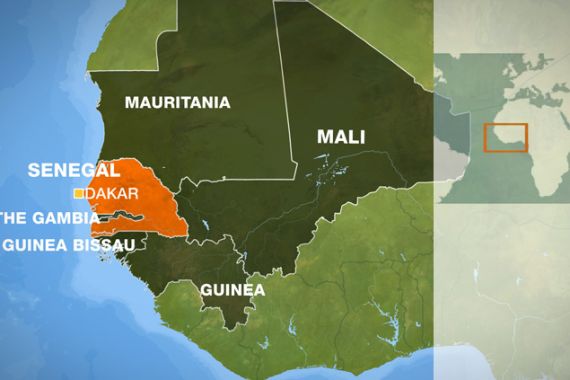Country Profile: Senegal
Senegal is considered one of West Africa’s most stable nations, but this month’s vote tests its democratic foundations.

Senegal, sitting on the most western point of the African continent, gained independence from France in 1960.
The West African country, bordered by Mali, Mauritania, Guinea, Guinea-Bissau and surrounding the Gambia almost entirely, was considered among France’s first colonial outposts with Dakar, the country’s capital, serving as the colonial capital of French West Africa.
With 94 per cent of the population Muslim and the official language French (national languages include Wolof, Maline, Seerere), modern Senegal is a confluence of Islamic expansionism and French colonisation.
Pre-colonial history suggests that the region was an entry point for Islam into sub-Saharan Africa, while the country has remained closely aligned with France even since independence.
Senegalese citizens were the first Africans to be offered French citizenship rights and the country’s first president, Leopold Senghor, considered one of the African continent’s pre-imminent intellectuals and thinkers, supported French foreign policy in exchange for economic aid and military support.
Despite enduring separatist rebellions in the Casamance region (located in southwest Senegal) high levels of unemployment and poverty, Senegal has, by and large, been considered one of the more stable post-colonial democracies on the continent.
Economic challenge
| POVERTY IN SENEGAL |
|
In 2005, an estimated 50.8 per cent were living under the poverty line. In 1994, the figure had been 68 per cent. Millennium Development Goals set the target to 34 per cent by 2015. Senegal is poorest in the rural areas, peaking in the disputed Casamance province. Usually the yonger generation from these poor areas have two options. They either migrate to the urban slums and live on the periphery of the larger cities, and work in the informal economy. Or, they can find a way to leave Senegal, and send remittances to their familiy back home. Up to two million Senegalese live outside the country; this is fairly large considering the population is only 12.8 million people. Source: One World |
Senegal’s robust democracy notwithstanding, the country’s economy has been a perennial challenge for its leaders.
The country’s economy is largely based on the export of groundnuts and fish, while remittances from overseas-based citizens (around two million) make up a large proportion of the economy as well.
Senghor advanced the idea of “African Socialism” that increased government participation in the economy. But Senghor’s government banned opposition parties and shrunk political participation in 1962 while the government’s emphasis on socialism failed to address the structural problems embedded in Senegal’s economy.
These deep-seated economic problems came to a head during the economic crisis of 1970s and Sanghor was forced to institute a range of reforms that led to the emergence of a political opposition, albeit a limited one.
Despite his efforts, Senghor’s support waned and he resigned in December 1980, and was replaced by Abdou Diouf in 1981.
Diouf swiftly reorganised the political system, including removing restrictions on political activity and recognising parties previously considered illegal.
He also advanced the liberalisation of the economy, including implementing the World Bank and IMF’s structural adjustment programmes, including privatising state firms.
Senegal managed to reduce government spending and enjoyed lower inflation, but the majority failed to benefit from the shifts in economic policy.
The rise of Wade
Diouf won the 1983 and in 1988 polls, but opposition parties and activists alleged widespread irregularities in the latter, culminated in part, to the rise of Abdoulaye Wade. A divided opposition allowed Diouf to win again in 1993 but by 2000, the tables had turned against the incumbent.
In 2000, Senegal was lauded for its democratic maturity when Diouf accepted defeat to the 73-year-old veteran politician Wade. Through a second round run-odd vote, Wade secured 58.5 per cent of the vote.
| SENEGAL: KEY FACTS | |||||||||||||
|
In doing so, Wade had dislodged the four-decade rule of the Socialist Party (PS) through the emphatic support he enjoyed from younger voters who chanted ‘Sopi’ (meaning change in Wolof) through the streets.
Wade changed the constitution, reducing the presidential tenure from seven years to five years, as well as reducing presidential terms from three to two. He also promised to end the fighting in Casamance and advance the independence of the judiciary. Crucially, as a champion of the youth, he promised to solve the country’s youth unemployment problems.
But contrary to his stated priorities, Wade’s first tenure as president has been fraught with political hiccups and allegations of attempting to centralise power, and set up a presidential dynasty. His emphasis on large-scale projects has also alienated youth who say his vision is misplaced and inconsequential for their development and progress.
Some regional anaylsts are convinced that Senegal is brewing for change. They say that the country’s economic difficulties and wider dissatisfaction with Wade’s rule will fashion a political shift in the country.
In a region that has endured scores of coups, a series of civil wars, Senegal is often cited as an example for the continent, for its tolerance for multiparty politics, freedom of expression and largely secular democracy; “the only country in West Africa not have to endured a coup or a civil war since independence,” as people love to say.
While the forthcoming presidential vote is unlikely to change that fact, it could offer a critical test of the country’s democracy.